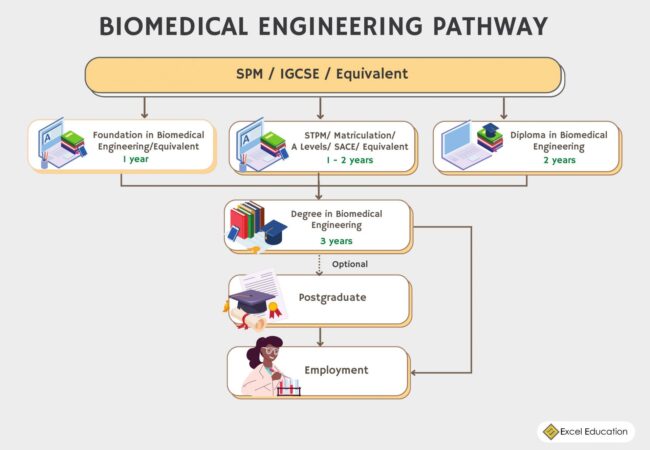
Careers in biomedical engineering will place you at the forefront of many fascinating advances in applied science, including the next generation of wearable gadgets, the most cutting-edge gene-editing methods, nano-sized robots that flow into the bloodstream to attack cancer cells, and more.
If you want to combine your passion for engineering with the capacity to build things that may save people’s lives in the medical field, a career in biomedical engineering may be the path for you to take. Because of both technological progress and the growing need for medical care for an aging population, biomedical engineering is now one of the most in-demand professions in the United States.
What is Biomedical Engineering?
The combination of engineering and medicine is known as biomedical engineering, and a professional in this discipline will collaborate with other engineers, scientists who work in basic laboratories, medical practitioners, and registered nurses. Students who take a course in biomedical engineering will gain the knowledge and skills necessary to design and test new medical equipment, install and maintain existing equipment, evaluate the safety, efficiency, and effectiveness of the equipment, and produce research reports, amongst other things.
It should come as no surprise that breakthroughs in science and engineering are increasingly being incorporated into the field of medicine given the rate at which technology is growing. Because of the combination of these two fields, a new area known as biomedical engineering has emerged, and as a consequence, employment in this sector has been generated.
What you’ll be studying in Biomedical Engineering?
At the undergraduate level, earning a degree in biomedical engineering should take you a total of three to four years to finish. The following are some of the subjects that will be discussed in both the lecture hall and the laboratory settings in biomedical engineering classes:
- Physiology and biomaterials.
- Organic chemistry.
- Statistics and calculus.
- Fluid and solid mechanics.
- Circuit design.
- Computational biology
- Cellular, tissue, and genetic engineering
- Clinical engineering
- Medical imaging
- Orthopedic Bioengineering
Want to know more about what you’ll be studying in Biomedical Engineering? Contact us now!
Skills Required to Study Biomedical Engineering
You need to have a strong interest in science and mathematics in order to be able to tackle issues of a highly technical nature when you begin any kind of study in engineering. This is a must for all engineering fields. You must be willing to add the life sciences and medical skills that are essential to grasp the context of the challenges. If you want to have a successful career as a biomedical engineer in the future, you will need to acquire certain skills in this area.
- Communication skills
Because you will often collaborate with members of different teams and patients, you will frequently need to be able to articulate your opinions coherently. Examine the suggestions made by other people and think about how you may include them in the process of finding a solution to the issue.
- Mathematic skills
Focus mostly on improving your mathematical skills. Calculus and other forms of advanced mathematics, such as statistics, are essential tools for the analysis, design, and problem-solving work that biomedical engineers are required to do.
- Creativity skills
When it comes to developing new pieces of medical equipment and technologies, bioengineers and biomedical engineers need to have an innovative mindset. In order to develop innovative and integrative improvements in medical devices and equipment, it is often necessary to think in a manner that is unconventional or to go beyond the normative expectations of the industry.
- Problem-solving skills
It should come as no surprise that a student in this subject would get training to address issues connected to biology while also being schooled to keep a watch out for the adverse effects of medical equipment and prescribe the one that is most suited. The majority of the time, biomedical engineers work with complicated biological systems. They need to be able to work both alone and together in order to contribute their thoughts to the process of resolving the difficult challenge.
General Pathway of Biomedical Engineering Career

Bioengineers and biomedical engineers normally require a bachelor’s degree in bioengineering, biomedical engineering, or a field of engineering that is closely connected to bioengineering and biomedical engineering. Students graduating from high school with a scientific background who are considering careers as bioengineers or biomedical engineers should unquestionably concentrate on subjects like chemistry, physics, and biology in their academic preparation.
After SPM/IGCSE/O-Levels, you must finish the Pre-University programme. You can decide to obtain a Foundation, Diploma, STPM, or other relevant qualifications before enrolling in a Biomedical Engineering degree programme.
Upon completion of your Biomedical Engineering degree, you can choose to continue with postgraduate studies. The Biomedical Engineering sector is expanding and offers a variety of options for career advancement. You do not need to have a postgraduate degree or be a professional to be successful in this field. You always have the option to start working after graduation, even if it means accepting a lesser wage.
For more information on how to pursue a study in Biomedical Engineering, contact us now for free consultation.
Entry Requirements to Study Biomedical Engineering in Australia
Academic entry |
|
English language entry |
|
Note: The requirements may be different at different colleges; for questions about additional admission requirements, please get in touch with us!
Top Universities in Australia to Study Biomedical Engineering in Australia
#1 University of Technology Sydney

The University of Technology Sydney (UTS) is widely recognized as being among the top 150 institutions in the world due to the university’s focus on the application of both research and education. UTS campus is made up of linked spaces that promote collaborative learning, research, and practical education across all faculties. The campus, which is situated in the middle of Sydney, can be reached on foot in a matter of minutes from both the key transportation hub and the core business sector of the city.
Scholarships of up to AUD 12 million are distributed annually via UTS’s one of the most substantial financial aid programs available to students from other countries. Additionally, UTS offers services to benefit foreign students, like assistance with the English language and locating suitable housing.
Program | Bachelor of Engineering (Honours) – Biomedical Engineering |
Duration | 4 Years |
Intake | Feb, July, Aug |
Full Indicative Fees (2023) |
For more information regarding the scholarships, program structure, and entry requirements, contact us now for free consultation.
#2 University of Western Australia

The University of Western Australia (UWA) is known for its strong teaching, research, and academic departments. UWA’s exceptional student-to-teacher ratio and a five-star rating for teaching excellence imply it supports meaningful teaching, learning, and research. QS 2023 ranks it among the world’s top 100 universities. UWA in Perth has some of the country’s best educational and research facilities. The university has a second campus in Albany, Western Australia. Like the other campus, Albany offers a world-class learning environment with the latest technologies.
Program | Bachelor of Engineering (Honours) – Biomedical Engineering |
Duration | 4 Years |
Intake | Feb, July |
Full Indicative Fees (2023) | Contact Us |
For more information regarding the scholarships, program structure, and entry requirements, contact us now for free consultation.
#3 University of Sydney

The University of Sydney is a prestigious educational establishment that is frequently listed among the top 50 institutions in the world. It can be found in the city of Sydney, which is situated in Australia (QS World University Rankings, 2023). According to the QS Graduate Employability Rankings, 2022, the university is also rated first in Australia and fourth in the globe for the employability of its graduate students. When it comes to studying at the undergraduate and postgraduate levels, students come from every corner of the world.
Students have access to a wide variety of amenities on campus, such as a rock-climbing center and a gymnasium that has a swimming pool of Olympic size that is heated. In addition, there are art galleries, museums, cafés, restaurants, and pubs that are available for your enjoyment. Additionally, students get access to the biggest academic library in the southern hemisphere while they are enrolled at this institution.
Program | Bachelor of Engineering in Biomedical Engineering (Honours) |
Duration | 4 Years |
Intake | Feb, July |
Full Indicative Fees (2023) |
For more information regarding the scholarships, program structure, and entry requirements, contact us now for free consultation.
#4 Monash University

In a little more than half a century, Monash University has established an outstanding reputation for itself both nationally and internationally for the quality of its research and teaching. It is an education and research community on par with the best in the world, a place where bright students and researchers, ideas, and solutions to some of the most pressing problems in the world are fostered and allowed to flourish.
The university is a part of Australia’s Group of Eight, which is a consortium of Australia’s most prestigious educational institutions that are known for their outstanding work in both teaching and research. It is one of the top one percent of colleges in the world according to its ranking. Its alumni network is globally linked, and its members are at the forefront of social and technical advancement at many of the top firms in the world.
Program | Bachelor of Engineering (Honours) – Biomedical engineering |
Duration | 4 Years |
Intake | Feb, July, Oct |
Full Indicative Fees (2023) |
For more information regarding the scholarships, program structure, and entry requirements, contact us now for free consultation.
#5 Flinders University

Flinders University was established in 1966, and by the year 2020, the Times Higher Education World University Rankings placed it among the top two percent of universities worldwide. Its campuses are beautiful examples of how urban and rural environments can coexist together. Students from other countries who want to experience all that Australia has to offer will find that Flinders University’s location in Adelaide is in the perfect spot for them.
In addition, the city of Adelaide is encircled by stunning hilly landscapes and golden beaches, and it is conveniently located near many destinations that are perfect for weekend trips. It should come as no surprise that the Global Liveability Study, which was conducted in 2016, ranked it as one of the top five most livable cities in the world.
Program | Bachelor of Engineering (Honours) – Biomedical |
Duration | 4 Years |
Intake | Feb, July |
Full Indicative Fees (2023) |
For more information regarding the scholarships, program structure, and entry requirements, contact us now for free consultation.
For more stories like this, join the Excel Education community on Facebook or follow us on Instagram
Need help with your university application? Connect with us +60162206607
About Author

Nik Noor Fatihah
I am a student at the National University of Malaysia, where I am now pursuing a degree in business administration with a majoring in marketing. Loves painting, designing, and singing 🙂

